- Home
- Hugo Hamilton
The Speckled People Page 5
The Speckled People Read online
Page 5
We didn’t know they were wrong. We didn’t know that wearing the wrong badge was like singing the wrong song in the cinema. So when my father saw us coming into the house wearing poppies, he slammed the door and all the clocks and cups and saucers shivered. Franz shivered too. My father ripped the poppies off so fast that he stabbed his own finger with the pin and I thought the badge was bleeding. He ran into the kitchen and opened the door of the boiler and threw the badges into the fire. Then he ran his finger under the tap and looked for a plaster while the badges burned to nothing and I thought it was a big waste because Mr Cullen had paid money for them.
‘Who gave you those damn things?’ my father wanted to know.
‘Not like that,’ my mother said. ‘They don’t understand.’
‘Who gave you those poppies?’ I could see that my father hated even saying the word. ‘They’re British army poppies. Who gave them to you?’
‘Mr Cullen.’
‘Mr Cullen has no right. I’m going over to have a word with him.’
But my mother pulled on his elbow again. She told him that Mr Cullen’s father died in the First World War and we didn’t want to offend him. My father said Mr Cullen was trying hard to offend us. Lots of good people died on the German side, too, as well as all the Irish people who died fighting against the British army instead of joining in with them. And what about all the people who died in the famine and there are no badges you can get for them. Mr Cullen was mocking us, he said, giving us the poppies on purpose because the Germans lost the war and the Irish lost the six counties. My mother says she’s not offended and Mr Cullen is too nice a man to even think of something like that. Its time to be big-hearted, she says. It’s not important to win. And one day they’ll commemorate all the people who died in those wars, not just their own.
‘They have no children,’ she said.
I was afraid that my father would find out we got chocolate and that would go in the fire, too. One day when we were coming home from the shop with Smarties, Franz dropped one of them on the street and my mother told him to leave it there because it was dirty. Then he threw the rest of the Smarties on the ground as well. If one was dirty then they must all be dirty. So I thought this was the same, that we had brought home something from outside on the street that was dirty.
‘Never let me see those things again,’ my father warned.
‘Explain it to them, for God’s sake,’ my mother said. She doesn’t like things being taken away from us without something else put in its place. She wants everything to be explained in a calm way, sitting down.
So my father sits at the table and we sit opposite him and he tells us why we can’t accept poppies from anyone. First of all, he says, there was the British empire. He takes out a map of the world and points to all the pink bits that were owned by the British. Then he says the Germans wanted to have an empire, too, but the British didn’t like the idea, so that was the First World War. He says millions of men died when two empires fought against each other and not even one person was killed on their own soil. It was big countries squabbling over little countries. Then right in the middle of it all the Irish decided to declare their own free state. We serve neither king nor kaiser, is what the Irish were saying to themselves and to all the other small countries around the world. But after that it’s hard to understand what my father is saying any more because my mother’s name was Kaiser and I don’t know what the difference is between the First World War and the Second World War, and who the Nazis are and what they have to do with us. My mother says the Germans hardly behaved any better than the British, that instead of just having an empire and keeping slaves, the Nazis made slaves of their own people. The Germans turned themselves into slaves and started killing all the other people who were not German enough and my father says it’s all the same thing.
‘That’s the end of the road,’ he says, and I think there are people being killed at the end of the road and I don’t want to go down there any more. My father says all we need to know is that poppies are not allowed in the house and that’s the end of the story. We’ll get our own badges and flags and songs. On St Patrick’s day, we get shamrock and green badges and tricoloured jelly and ice cream.
At night in bed I’m afraid of silence. I can see the light coming under the door and I think my father still wants to go over to Mr Cullen, only that my mother is holding him back telling him to leave it. It’s all in the past. We’re in the future and we have to behave like the future. Then I hear the music coming up from the front room. Big German music spreading all over the house again, all the way up the stairs and in under the door with the light.
On Sunday, Onkel Ted comes to tea again with his wet hair combed in lines. I tell him about all the balls that Miss Tarleton gave back but the Miss Lanes took away again. I tell him that we were allowed to wash Mr Cullen’s car and that we got chocolate. I tell him about the poppies and all the people being killed at the end of the road, but my mother says we won’t talk about that now. I tell him that a man on the bus said Nazi to my mother under his breath, but we won’t talk about that either. Then it’s time to reach into Onkel Ted’s pocket for the sweets and I don’t know what to tell or not to talk about any more.
After that it’s hard to know what’s right and wrong. My mother says we’ve started doing a lot of things that make no sense. One day Franz put stones in his ears and he couldn’t hear anything any more. Maria put a marrow-fat pea in her nose and it swelled up so much that the doctor had to come and take it out. Franz hit his thumb with a hammer and his finger went blue. Then I started burying all the silver spoons in the garden with my grandfather’s initials FK written on them and my mother had to find the treasure. She laughs and says she hopes we won’t do any more stupid things for a while. But then one day I started throwing the toy cars in the fire. I carried the box with all my cars into the kitchen and opened the door of the boiler by myself. I could see them lying on top of the orange coals. I watched them lighting up blue and green for a moment, until the flames disappeared and they went black and silver. One by one, I threw my cars on top of the coals until my mother came and asked me if I was out of my mind. She pulled me away and slammed the door of the boiler shut. She kneeled down and looked straight into my eyes. She makes everything better with hugs that break your bones. She tells me a story and says it’s all forgotten now and we won’t talk about it any more.
Seven
One day the boiler burst. It started hissing and clicking because of all the bad things that had been thrown into it. It got so hot that you could hear it cracking inside. Then there was a bang and it burst open with hot brown water gushing out all over the kitchen floor like tea with milk. My mother told my father to call the fire brigade. He frowned and sucked in air through his teeth. But then he put out the fire by himself. He carried the red coal out on a shovel and rolled up his sleeves to sweep the tea out the back door.
Then it’s winter and our house starts filling up with mice. The pipes are cold and there are mice in every room because they get in under the back door. More and more of them are coming in every day until all the mice from the whole city are living in our house, my mother says. They’re in the hall and on the stairs, everywhere you go. Any time you open the door and go into a room you see them running away. But mostly they’re under the stairs where things are kept, like jam jars and pots and old shoes. There are so many of them that you have to watch where you walk, because one day when Franz was running down the three steps from the hallway into the kitchen, a baby mouse ran out from under the stairs and got squashed. We all crouched down to examine the flattened corpse until my mother told us not to be so interested in blood and took it away on the shovel.
It’s so cold, we stay in one room by the fire where it’s nice and warm, but if you go from that room up to the bedroom, it’s like going out on the street and you need your coat on. My mother shows me her hands and says they will never get warm again. They’ve gone blue and green with the cold,
like mackerel. She wants me to take pity on her hands and please let them in under my jumper to get warm. Be a good boy and give shelter to my poor fish-blue hands, she says. Just let them in for a little second or two to get warm. Then I scream and laugh and my mother screams and laughs, because the mackerel are fast swimmers and they go up under my jumper and down around my neck into my shirt and my mother says: ‘Wie schön, wie schön warm’, oh lovely and cosy and warm.
Áine came back from London, but she’s so sad that she only talks to herself in the mirror now. She can’t even say ‘walk on the wall’ in Irish or English or go down to the seafront because her legs won’t carry her. She’s never going back to London, but she doesn’t want to go back to Connemara either, so she lives with us. Sometimes you hear her upstairs crying and my mother says something happened to her, something that can’t be explained or forgotten about either, so we just had to wait for her to get her words back. Onkel Ted has to come and make the sign of the cross over her, but still she won’t come out and nobody knows what to do. My mother says it’s the worst thing of all to be sad for yourself. You can help other people but often you can’t help yourself.
At night you can hear the mice scratching and chasing each other around. For a while we counted the number of mice we saw every day, but then we didn’t know if we were counting the same mouse twice in different rooms. My father bought two traps to catch them but that wasn’t enough, so he bought another one that would catch three of them at the same time. It made no difference. Even if you caught three mice each day, my mother said it would still take a hundred years to catch them all because they could have families faster than we could kill them. The only thing was to stop talking about them and then they would go away. One day, there was a dead mouse in the trap that was half eaten by his own friends, and my mother said it was time to stop talking about it. Mice have no feelings, she said, and some people have no feelings either.
Áine spent all her day sitting up in bed smoking cigarettes. My mother said the best thing was for her to find a new job, then she could buy new clothes and go out and meet new people. Áine’s legs wouldn’t even carry her to the front door, so my mother went around to all the neighbours to ask if anyone knew of any jobs. She spoke to people who owned a man’s shop and people in two grocery shops. After a long time she found a job in a gift shop, but Áine burst into tears on the first day and the owner told my mother that a gift shop is meant to be a happy place and nobody was going to buy anything from a person with tears in their eyes. He said he would prefer it if my mother came to work for him instead. My mother said she would love to work in the gift shop, but her hands were like mackerel and nobody was going to buy anything from fish-cold hands.
My mother said she knew what the problem was. If Áine had nice shoes then she would feel better and her legs would carry her down the street with no shame. My father said it was a waste and that everyone else in our house needed shoes, too, but my mother said it would all be paid back in other ways. So Áine got new shoes, but it made no difference. At night she left the light on in her room and my father said that was a waste, too, because she was not even reading a book, only sitting there smoking cigarettes. He said he gave up smoking when he wanted to buy German records and the only way of paying for them was to take the money from the cigarettes instead. If he had a mouse for every cigarette that Áine smoked and a penny for every mouse that he caught, he would be able to buy every opera and every symphony that ever existed on Deutsche Grammophon. He said it was the cigarettes that were making Áine sad. And one morning, my mother found a black hole in one of the pillow cases and she was afraid the house would burn down.
Every day my mother sits down with Áine and tries to make her smile. She says nobody can make you smile if you don’t want to. Every day my father goes to work on the train. Every day we catch three mice and every day new ones come. Every day I scream and laugh when my mother’s mackerel hands go under my jumper. Every Sunday Onkel Ted comes to tea after his swim at the Forty Foot because he doesn’t feel the cold. We tell him things that happened, but not about mice and not about Áine or the black holes burned in her dresses. My sister Maria pulls up her dress to show Onkel Ted her tummy and then we reach into the pocket of his jacket for the sweets. He goes upstairs to make the sign of the cross over Áine and when he comes down again, he says my mother should take her out dancing.
‘Irish dancing,’ my father said. ‘It would have to be Irish dancing.’
Then everybody is silent for a while looking at each other. Until my mother suddenly bursts out laughing and says she’s forgotten how to dance. Two silent brothers looking at my mother laughing and laughing at the idea of coming all the way over from Germany to bring an Irish woman out to Irish dancing. Onkel Ted smiles and waits for my mother to finish. He’s very serious and says there are things you never forget like cycling and swimming and helping other people. So one evening, my mother and Áine got dressed up and went dancing in the city. She put on her blue dress with the white spots and Áine put on her new shoes and a dress without holes in it. My father stayed at home reading his book and we sat on the carpet playing cars and listening to mice.
My mother said Irish dancing was not like waltzing or any kind of dancing that she had ever seen before. She said in Ireland your feet never even touch the ground. Everyone was floating, except for a man who sometimes slapped his heel down with a bang to the music as if he were trying to make holes in the floor. The dance hall smelled of smoke and perfume and sweat and it was filled with people of all ages. There was a priest and some nuns as well, sitting down in the seats. An old woman with long hair was dancing as if she were only sixteen. All the men were on one side of the hall and all the women on the other. The women danced as if the men didn’t exist, and at the refreshments counter there were people talking over tea and sandwiches as if the dancing didn’t exist. My mother watched three boys sharing a bottle of fizzy lemonade. Each time one of them drank through the straw, the other two kept watch to make sure he didn’t go past a certain mark before he passed it on to the next boy. They had tears in their eyes from drinking so fast.
All the time, men came walking across from the other side of the hall to ask my mother to dance, but she smiled and shook her head. She thanked them and asked them to dance with Áine instead. My mother says you can see a man’s face drop. But once they had come all the way over, they could not just turn around and go away again empty-handed. Áine didn’t want to dance either. She said her legs were gone soft. So the man had to pull her out by the hand, with my mother pushing her from behind. Then Áine tried to hold on to her seat with her foot and the chair went scraping out on the dance floor behind her, until my mother finally got it off. Even then the man had a hard job trying to make Áine dance, because her feet stayed on the floor and would not move. My mother said Áine had cement in her shoes and all the men soon stopped coming over.
She says it was funny, a German woman pushing an Irish woman out to dance against her will. She says it’s hard to understand what’s going on in people’s heads in Ireland. She says Irish people dance with their heads and speak with their feet. Everybody knows what’s inside everybody else’s head, but nobody ever says it out loud. They like to keep everything inside. She says German people say what they think and Irish people keep it to themselves and maybe the Irish way is sometimes better. In Germany, she says, people think before they speak so that they mean what they say, while in Ireland, people think after they speak so as to find out what they mean. In Ireland the words never touch the ground.
After the dancing, Áine lost her words altogether. There was something inside her head that was making her sick and my mother said if she didn’t speak about it, she would die. She was not eating any more either, only smoking cigarettes. Dr Sheehan had to come one day, because Áine started burning holes in her legs and arms. He said she would have to go to hospital, but then Onkel Ted came to make the sign of the cross over her once more. He spent a long time
in her room talking to her very quietly and nodding his head. He gave her lots of time to remember everything that happened, until she finally spoke in her own language. She told Onkel Ted something in Irish and he came downstairs with the answer. He said if Áine was to stop burning holes in her arms and legs, if she was ever to smile again and stop being sad, then she would have to get her baby back. So one day my mother and Áine went out and they came back with a new baby. She was going back home again because she was happy now. She didn’t need to smoke cigarettes and talk to herself any more because she had the baby to talk to. My mother helped her to pack her suitcase with lots of German baby clothes and they laughed because Áine said it was nearly like a German baby going home to Connemara. And the day she was leaving, it was my mother who was crying because Áine was smiling.
Men came to fix the boiler. There was some more brown tea with milk on the floor of the kitchen, but then it was all over and the pipes started heating up again. My father put lots of coal into the boiler so the house got warm. Then there was a delivery of coal. A truck stopped on the street outside and because they couldn’t go around the back, the men with black faces and black hands had to come through the house. My mother was afraid the wind would slam the doors shut in anger, so we had to hold them open, Franz at the front door, me at the in-between door, and Maria at the back door. She told us to count the bags as they came in. In Ireland people count in their heads, she said, but in Germany people count out loud. Out loud we counted – Eins, Zwei, Drei, Vier, Fünf … all the way up to fifteen. The men walked in stooped over with the heavy sacks, leaving long black marks where the sacks scraped against the wall on their way through. And where they went down the three steps towards the kitchen and out the back door, they put a black hand up every time to hold on to the door frame. One of the men winked and made me forget what number I was on. I didn’t know if I should be counting the sack that was coming or the sack gone by. But then I heard Franz counting the next number at the front door and I was able to catch up.

 Dublin Palms
Dublin Palms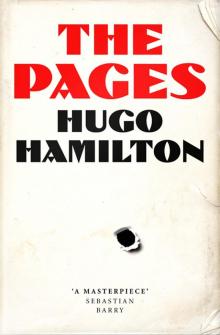 The Pages
The Pages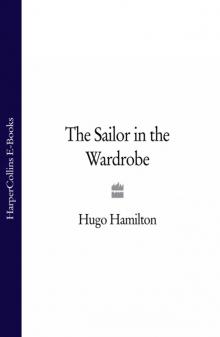 The Sailor in the Wardrobe
The Sailor in the Wardrobe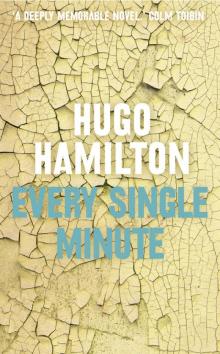 Every Single Minute
Every Single Minute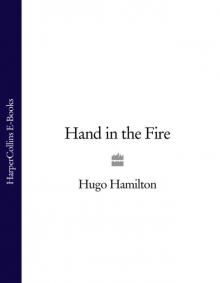 Hand in the Fire
Hand in the Fire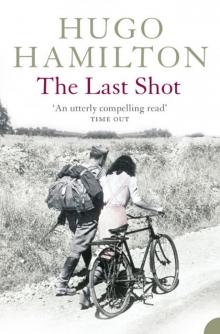 The Last Shot
The Last Shot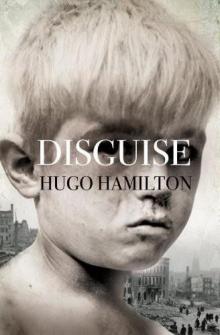 Disguise
Disguise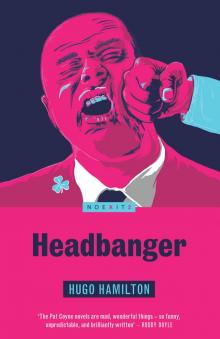 Headbanger
Headbanger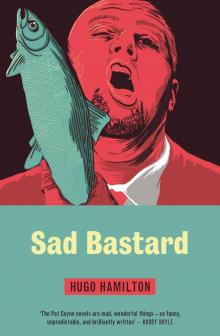 Sad Bastard
Sad Bastard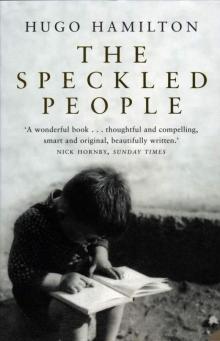 The Speckled People
The Speckled People